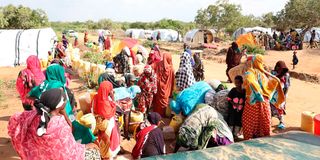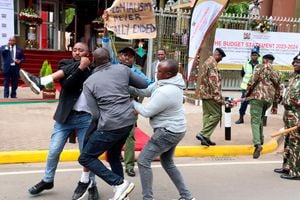Inside CSW plan to end women’s extreme poverty

Women fetch water trucked to their camp at Danisa on December 21, 2023. CSW has adopted a blueprint that seeks to end extreme poverty among women.
What you need to know:
- Studies have shown that girls from poor families miss 20 per cent of school days in a year due to lack of sanitary towels.
- The Commission on the Status of Women has adopted a robust plan to guide governments to strengthen financing and institutions to eradicate women’s and girls’ extreme poverty.
In 2020, a 17-year-old pupil at Damascus Primary School in Dandora on the outskirts of Nairobi, narrated how period poverty had taken its toll on her.
The girl disclosed how it was usual for her to miss a few days of school each month because she lacked sanitary towels to use when she had her periods.She is among millions of girls across the country whose education was disrupted by poverty.
Period poverty is being unable to work or attend school because of lack of funds for sanitary products and makes life even harder for girls.
Period poverty is one of the main challenges that girls and even women in Kenya continue to grapple with. Studies have shown that girls from poor families miss 20 per cent of school days in a year due to lack of sanitary towels.
Data from the Ministry of Education indicates that a girl that is absent from school for four days in 28 days loses 13 learning days, equivalent to two weeks of learning in every school term.In an academic year (nine months), a girl loses 39 learning days equivalent to six weeks of learning time.
A girl in primary school, between grades 6 and 8, loses 18 learning weeks out of 108 weeks.Within the four years of high school, a girl can lose 156 learning days, equivalent to almost 24 weeks out of 144 weeks of learning.
Girls and women undergoing such challenges could, however, have a reason to smile about after the Commission on the Status of Women (CSW68) adopted a robust blueprint that will guide governments to strengthen financing and institutions to eradicate women’s and girls’ extreme poverty.
The commission is working on ensuring a gender lens in national budgeting processes. The blueprint seeks to prevent governments from regressive taxation that disproportionately impacts women and girls with low or no income.
It’s also rooting for the implementation of gender-responsive economic and social policies, including increased women’s representation, leadership and participation in economic institutions.
In addition, the blueprint seeks to enforce core labour standards to ensure equal pay for work of equal value, and implement policies to support women-owned businesses.
Globally, 10.3 per cent of women live in extreme poverty today, according to the UN, which adds that the progress towards ending poverty needs to be 26 times faster to achieve the Sustainable Development Goals by 2030.
Women in East Africa will have to cope with the impact of new tax measures on essential goods and services in their budgets for 2024.
Finance ministers imposed taxes that will increase the basic cost of items like sanitary towels, diapers, secondhand clothes and fuel, disproportionately affecting women's daily lives.
In Kenya, the rejected Finance Bill initially included additional taxes on locally manufactured sanitary pads and diapers.
Parliament only removed the proposed taxes on domestically produced items after sustained public pressure, providing a reprieve to women.
Regressive taxation by governments that disproportionately impacts women and girls with low or no income have been the biggest undoing for women.
The blueprint also recognises engaging financing women’s organisations as critical in fighting women’s poverty.
Robust, flexible and multi-year financing for locally led feminist movements and women’s rights organisations is critical to addressing poverty, as proved by existing mechanisms such as the UN Trust Fund to End Violence against Women and Women’s Peace and Humanitarian Fund.
The commission also adopted a resolution on HIV-Aids led by the Southern Africa Development Community (SADC), which calls for increased investment in gender equality and empowerment of all women and girls in the HIV-Aids response.
According to a 2020 study by the International Centre for Tax and Development, the Institute of Development Studies found that explicit biases against women continue to exist in some countries around personal income taxes.
“The biggest bias against women is that countries increasingly depend more on consumption taxes such as VAT, which are regressive and can place a disproportionate burden on women and other marginalised groups, while providing tax incentives and lax enforcement for large corporations and transnationals.
”CSW is the principal global intergovernmental body exclusively dedicated to the promotion of gender equality, the rights and the empowerment of women.
It is instrumental in promoting women’s and girls' rights, documenting the reality of their lives throughout the world, and shaping global standards on gender equality and the empowerment of women and girls.





